Chinese New Year symbols hold deep meanings that celebrate family, fortune, and renewal. Red decorations signify joy and prosperity, while red envelopes filled with money share blessings for the year ahead. Foods like dumplings and fish represent wealth and abundance, enhancing the reunion dinner's significance. Zodiac animals, like the brave Tiger and powerful Dragon, embody unique traits that influence the upcoming year. Traditional practices, such as lion dances and house cleaning, ward off bad luck and usher in positive energy. There's so much more to explore about these rich traditions and symbols that shape this festive season.
Key Takeaways
- Chinese New Year symbols, such as red, represent good fortune, joy, and prosperity, enhancing the festive atmosphere and warding off evil spirits.
- Dumplings symbolize wealth and family unity, enjoyed during reunion dinners to reinforce bonds and traditions.
- Fish signifies abundance, with leftover fish representing extra good fortune, reflecting the cultural wish for surplus each year.
- Red envelopes (hongbao) filled with money symbolize blessings and good wishes for the year ahead, reinforcing the importance of generosity.
- The Chinese zodiac animals embody unique traits influencing personality, career prospects, and relationship compatibility, enriching cultural significance during the New Year.
Overview of Chinese New Year
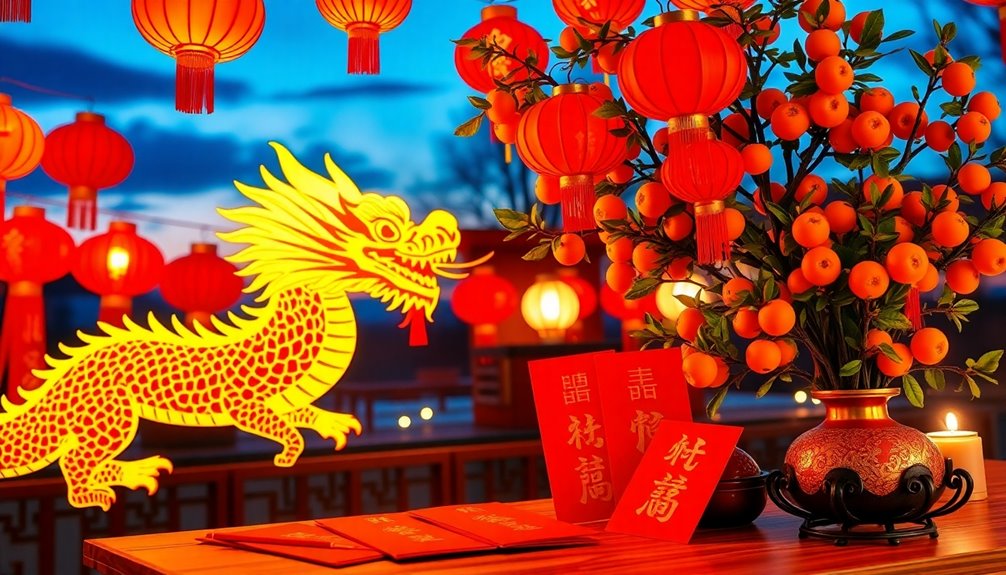
Chinese New Year, also known as Lunar New Year, is a vibrant 15-day celebration that kicks off with the Spring Festival and wraps up with the Lantern Festival.
During these Chinese New Year celebrations, families come together to exchange gifts, including red envelopes filled with money, a symbol of good fortune.
You'll notice various traditions aimed at attracting good luck and warding off bad luck, like dragon dances and lively parades.
The first day of the new year is particularly significant, filled with rituals that emphasize new beginnings and the hope for prosperity.
Community involvement shines through as homes are decorated and traditional dishes are prepared, fostering a sense of togetherness that defines this joyous occasion.
Symbolic Foods and Their Meanings
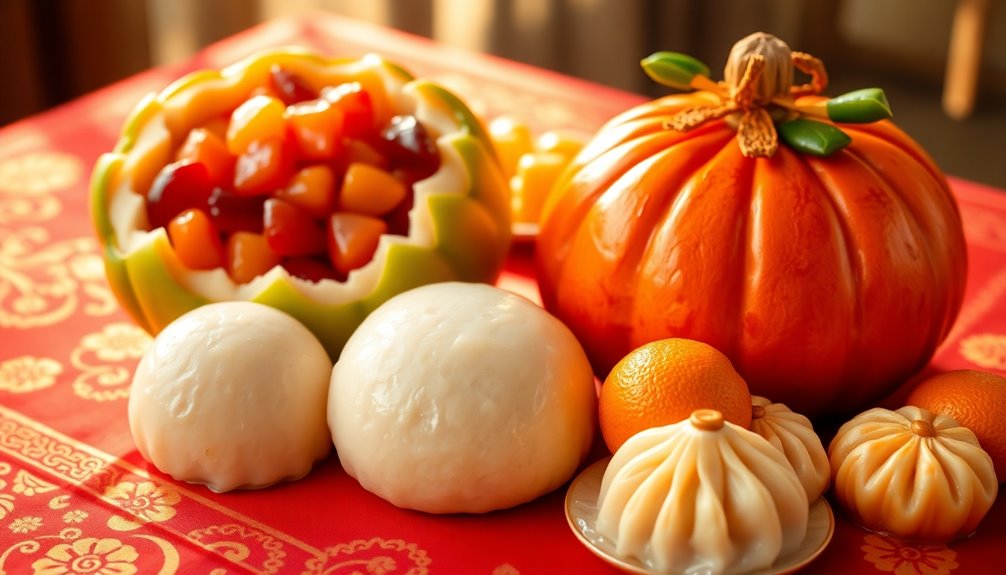
When you celebrate Chinese New Year, the foods you choose carry deep meanings.
Dumplings symbolize wealth, while fish represents abundance, reminding you of the good fortune to come.
Don't forget the sweet rice balls, which highlight the importance of family reunion and togetherness during this festive time.
Dumplings and Wealth Symbolism
Dumplings hold a special place in the celebrations of the Lunar New Year, as their shape resembles ancient gold ingots, symbolizing wealth and prosperity.
During the reunion dinner on New Year's Eve, families gather to enjoy these delightful dumplings, reinforcing family unity and shared fortune. Each bite not only represents good luck but also invites financial prosperity for the year ahead.
A fun tradition involves hiding a coin inside a dumpling; the lucky person who finds it is believed to enjoy exceptional wealth in the coming year.
With various fillings, dumplings symbolize the abundance of resources and blessings, making them an essential dish during Chinese New Year festivities. Embracing dumplings truly enhances your celebration experience.
Fish and Abundance Significance
Fish plays a pivotal role in Lunar New Year celebrations, symbolizing abundance and prosperity thanks to its pronunciation, which closely resembles the word for surplus in Chinese.
During the New Year's Eve reunion dinner, serving fish is customary, as leaving leftovers is believed to bring extra good fortune in the coming year. You'll often see fish decorations hung in homes to invite affluence and positive energy, underscoring its significance in the traditions of Chinese New Year.
The phrase "Nian Nian You Yu," meaning "every year, there's surplus," reflects wishes for wealth and abundance. Additionally, serving whole fish symbolizes completeness and unity, highlighting the importance of family and togetherness during this festive time.
Sweet Rice Balls Tradition
Sweet rice balls, or Tang Yuan, hold a special place in Chinese New Year celebrations, particularly during the Lantern Festival.
These round treats symbolize family reunion and completeness, reflecting the importance of family ties during the New Year. Made from glutinous rice flour and often filled with sweet fillings like sesame paste or red bean, Tang Yuan is associated with good fortune.
When you enjoy these sweet rice balls, you embrace the hope for a harmonious family and a prosperous year ahead. The preparation and sharing of Tang Yuan highlight the cultural significance of food in fostering connections among family members and friends.
This delightful dish truly embodies the spirit of togetherness and celebration during this festive season.
The Significance of Red
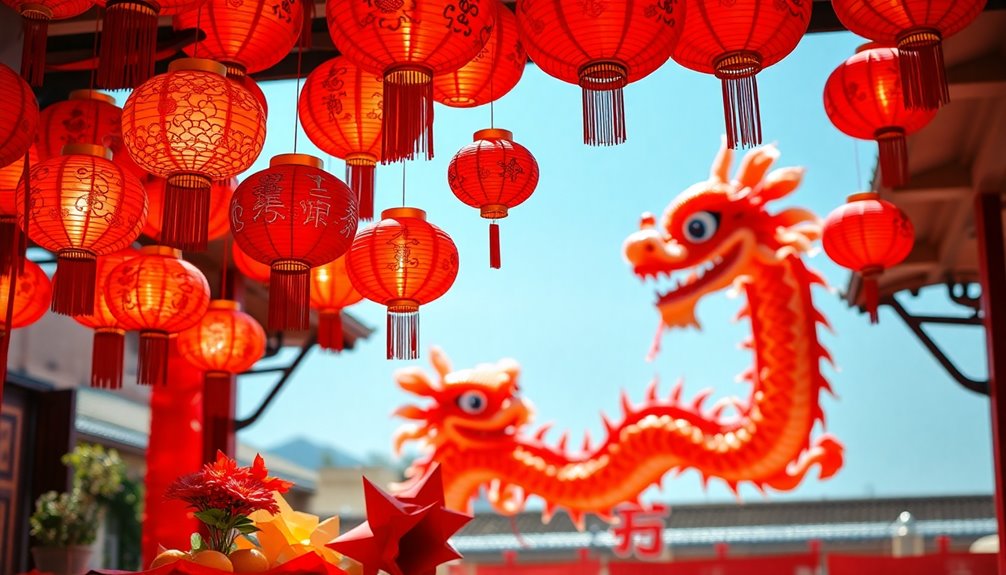
Red dominates the Chinese New Year celebrations, embodying good fortune, joy, and prosperity. This vibrant color fills homes and streets with decorations like red lanterns, which not only enhance the festive atmosphere but also ward off evil spirits and bad luck.
You'll notice red everywhere, from banners to table settings, all meant to invite luck into your life for the coming year. One cherished tradition involves gifting red envelopes (hongbao) filled with crisp bills, symbolizing blessings and prosperity.
Avoiding the number four during this time reflects the cultural belief that it sounds like "death," further emphasizing red's role in promoting life and happiness. Embrace the spirit of red, and you'll surely attract good fortune during this joyous celebration!
Zodiac Animals and Their Traits
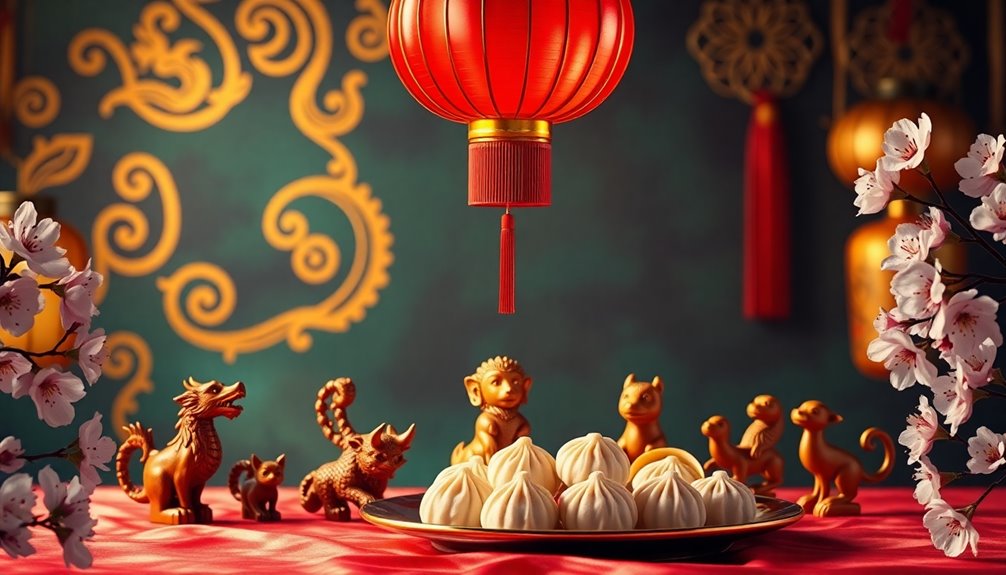
As you celebrate the vibrant traditions of Chinese New Year, it's also a perfect time to reflect on the zodiac animals that play a significant role in shaping personalities and lives.
The Chinese zodiac consists of 12 zodiac animals, each linked to unique personality traits. For instance, the Rat embodies resourcefulness, while the Ox signifies diligence. If you were born in the Year of the Tiger, you might possess bravery and leadership qualities.
These traits are believed to influence various aspects of life, including career prospects and relationship compatibility. As you look forward to the upcoming Year of the Dragon in 2024, remember it symbolizes power, good fortune, and prosperity, showcasing the profound impact of these cultural beliefs.
Cultural Performances and Traditions

Cultural performances during Chinese New Year bring communities together in a vibrant celebration of tradition and joy. One of the highlights is the lion dances, believed to scare away evil spirits and usher in good fortune.
Alongside these dances, firecrackers create loud noises that enhance the festive atmosphere and further repel any malevolent forces. You might also see the majestic dragon, a symbol of strength, parading through the streets, especially during events like the San Francisco Lantern Festival Parade.
These cultural performances foster a sense of togetherness and pride in your community. The red color, woven into decorations and clothing, reflects the legend of the monster Nian, reminding everyone of the traditions that keep evil spirits at bay.
Floral and Natural Symbols

During Chinese New Year, floral and natural symbols play a significant role in enhancing the festive spirit.
These elements not only beautify your surroundings but also carry deep meanings that resonate with the themes of prosperity and good luck.
- Bamboo: Represents growth and harmony; multiple stalks signify abundant blessings.
- Orchids: Valued for their association with good luck and fortune; perfect for floral arrangements.
- Sunflower Seeds: Symbolize wishes for many children, reflecting family importance.
You can also enjoy candied kumquats, which represent sweet happiness, and decorate with lanterns during the Lantern Festival to guide good fortune into your home.
Embracing these symbols can truly enrich your celebrations!
Red Envelopes and Their Purpose
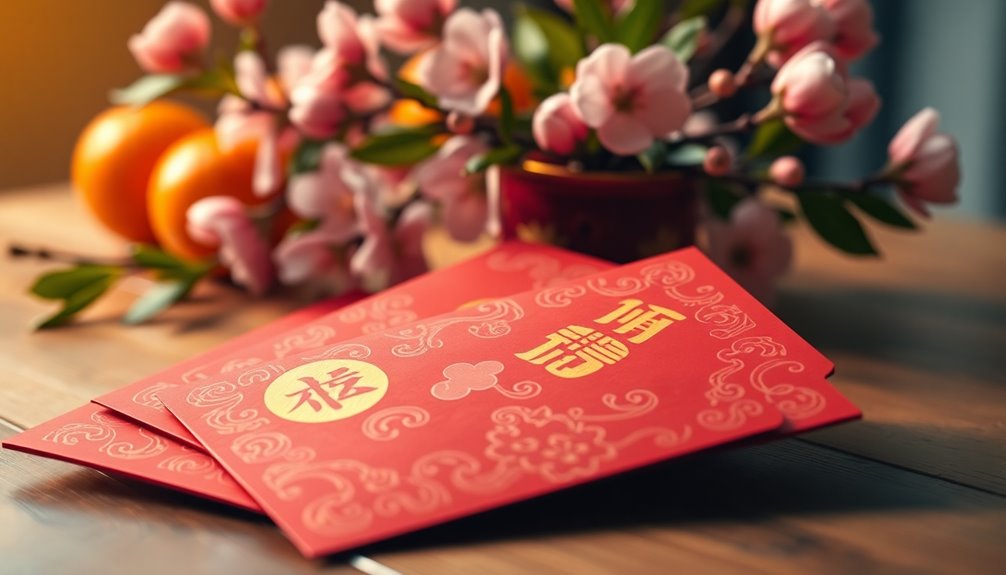
One of the most cherished traditions of Chinese New Year involves giving and receiving red envelopes, known as "Hongbao."
These vibrant packets, typically filled with money, symbolize good luck and prosperity for the recipient. Elders and married couples usually gift red envelopes to children and young adults, reinforcing family bonds and passing on blessings for the year ahead.
It's crucial to recognize that the amount of money inside is often an even number, as odd amounts are linked to funerals and considered inauspicious. New, crisp bills are preferred, as they're believed to bring better luck.
Ultimately, the act of exchanging red envelopes embodies goodwill, highlighting the cultural significance of generosity and sharing during the festive season of Chinese New Year.
Fish and Prosperity
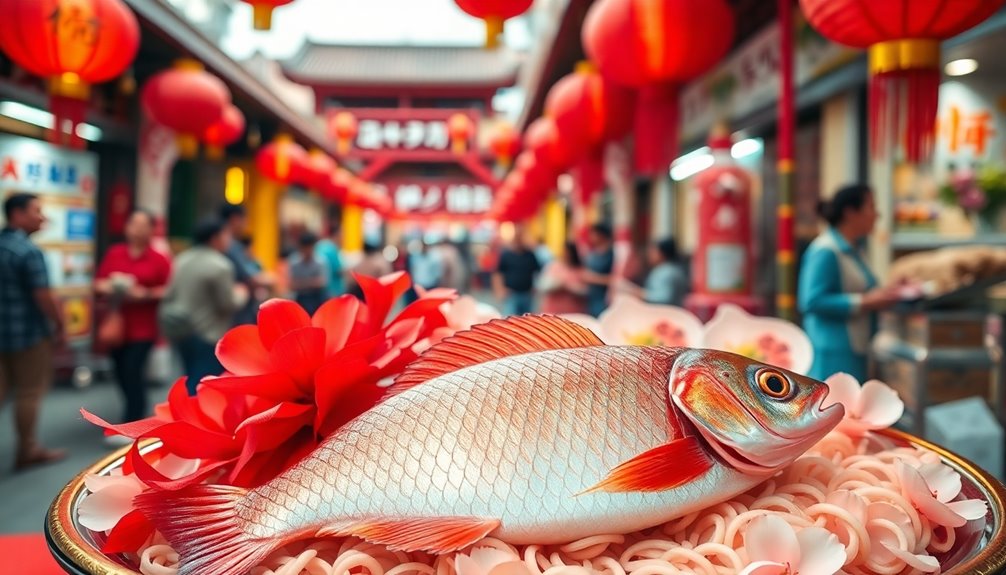
As you celebrate Chinese New Year, the symbolism of fish plays an essential role in the festivities. The word for fish (鱼, yú) sounds like the word for abundance (余, yú), making it a powerful emblem of prosperity.
During the reunion dinner, serving fish is crucial, as leftovers symbolize surplus and good fortune for the year ahead. You'll also notice vibrant fish decorations in homes, inviting affluence and wealth.
Remember the phrase "Nian Nian You Yu" (年年有余), which wishes for surplus every year.
Here are three key points to remember:
- Fish served symbolizes abundance and prosperity.
- Fish decorations enhance the festive atmosphere.
- The tradition reflects hopes for continuous good fortune.
Family Traditions and Practices
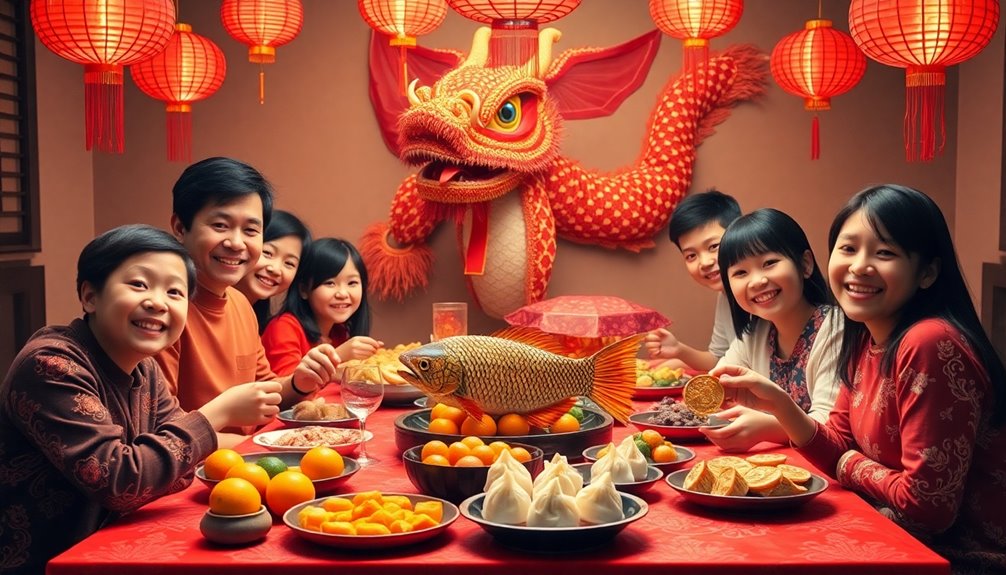
Family traditions and practices shape the essence of Chinese New Year, fostering a sense of unity and continuity. You settle debts before New Year's Eve to start fresh, emphasizing harmony. The reunion dinner on New Year's Eve is essential, featuring symbolic dishes that bring good fortune and joy.
| Tradition | Meaning | Practice |
|---|---|---|
| House Cleaning | Sweeping away bad luck | Clean before the New Year |
| Avoid Sharp Objects | Prevent cutting off good luck | Don't use knives or scissors |
| Reunion Dinner | Strengthening family bonds | Gather for symbolic dishes |
| Careful Speech | Maintaining positive energy | Use auspicious words |
| Sweeping the Floor | Ensuring good fortune remains | Avoid sweeping during the holiday |
These rituals create lasting memories and strengthen family ties.
Frequently Asked Questions
What Are the Most Powerful Chinese Symbols?
When exploring powerful Chinese symbols, you'll find the dragon stands out for its strength and protective qualities, often associated with good fortune.
The Fu character, which represents happiness and blessings, also carries significant weight.
Additionally, bamboo symbolizes growth and harmony, while fish is linked to abundance.
Red, the color of joy, plays an essential role in attracting luck and warding off evil spirits.
Each symbol contributes to the richness of Chinese culture and traditions.
What Do the Chinese New Year Ornaments Mean?
Chinese New Year ornaments hold deep meanings for you. The Fu character, often hung upside down, brings blessings and happiness into your home.
Red lanterns light the way, warding off evil spirits while attracting good fortune.
Fish decorations symbolize prosperity, as the word for fish relates to surplus.
Pinwheels blow away bad luck, creating a joyful atmosphere.
Finally, the trio of Fu, Lu, and Shou represents happiness, wealth, and longevity, wishing you a prosperous year ahead.
What Are Three Traditions of Chinese New Year?
You might think Chinese New Year is just about fireworks and festivities, but it's so much more!
One key tradition is the reunion dinner on New Year's Eve, where families gather to enjoy symbolic dishes.
Another is the vibrant lion and dragon dances that chase away evil spirits.
Ultimately, exchanging red envelopes filled with money brings good luck and prosperity, especially to children.
These traditions deepen family bonds and create lasting memories.
What Are the Core Values of Chinese New Year?
The core values of Chinese New Year revolve around family, prosperity, and renewal.
You prioritize family unity during reunion dinners, sharing a feast that strengthens your bonds.
You also focus on abundance, enjoying foods like fish and dumplings that symbolize wealth.
Cleaning your home represents a fresh start, sweeping away bad luck to welcome positive energy.
Finally, you honor traditions, participating in activities like lion dances to invite good fortune and scare away negativity.
Conclusion
As you immerse yourself in the vibrant world of Chinese New Year symbols, you uncover layers of meaning that connect generations. Each tradition, from the fiery red decorations to the enticing foods, whispers stories of hope, prosperity, and familial bonds. But wait—what will you discover about your own zodiac animal? Will it reveal hidden traits that resonate with you? Embrace the mystery and let the symbols guide your journey through this enchanting celebration.








